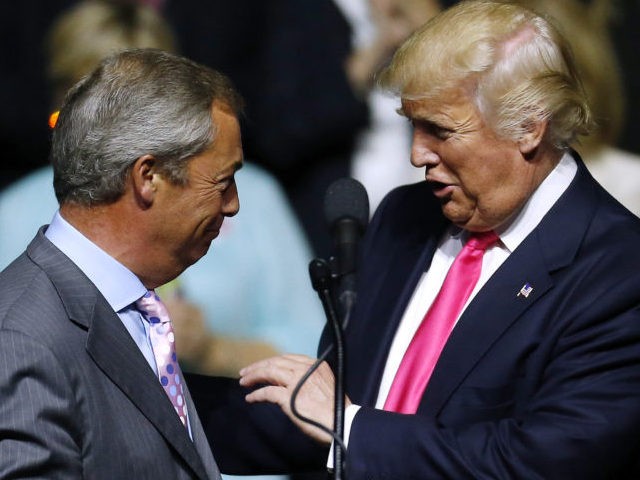Nigel Farage has said that U.S. President Donald Trump remains a staunch ally of the UK. But the Brexit Party leader fears that Washington and London will not have agreed on a free trade deal before November’s presidential election.
President Trump, whose mother was Scottish and British by nationality, has been an avid supporter of Brexit since his 2016 election campaign and promised a “massive new trade deal after Brexit”.
Four years on from the June 23rd, 2016, vote to leave the European Union, President Trump’s fondness for the UK has not waned, according to the President’s friend, British politician Nigel Farage.
“I can’t think there’s been an American president for a very long time with stronger Anglophile and English speaking world tendencies than Donald Trump,” Mr Farage told Spectator USA in an interview on Thursday.
The Brexit Party leader said he observed a shift from the Obama administration, which saw Germany as the “dominant country in a new European state”, to President Trump’s return to “more traditional alliances” cemented between the UK and U.S. during the Second World War.
Mr Farage explained that kickstarting a new Anglo-American relationship has been delayed for years since the vote.
“The Brits have not really been able to fully respond because, of course, we’re still stuck with Brexit negotiations. But now I think that Trump and many of the people around Trump want to see [a new relationship] in terms of security, in terms of defence, in terms of investment, in terms of commerce, and business. I think they all want to see a much closer relationship with the UK,” Mr Farage said.
Former Prime Minister Theresa May had delayed triggering Article 50 — the legal mechanism for leaving the EU — until March 29th, 2017, and then delayed the exit date twice. The former Remain-dominated parliament forced Prime Minister Boris Johnson to delay Brexit until January 31st, 2020. While out of the EU, officially, the UK remains in a transition period, tied to the bloc’s trading restrictions, until December 31st, 2020.
However, the delays and accepting a transition period while the UK and EU thrash out a new deal may come at the expense of a trade deal with the United States, as President Trump goes into campaign mode ahead of another national poll in November.
President Trump’s trade representative Robert Lighthizer had warned earlier this month that it would be “almost impossible” to pass a bilateral free trade agreement before then.
“That would be very, very, very quick time. I think it’s unlikely that that happens,” Mr Lighthizer had said.
“It is almost impossible unless the members [of Congress] decided they want to do something extraordinary to have it actually come before the Congress before November,” he added.
Mr Farage, unfortunately, agrees with this assessment, telling Spectator USA journalist Amber Athey that there was “just about zero” chance.
Reflecting on President Trump’s November 2016 victory, Mr Farage recalled that “when I went into the Trump Tower on Saturday the 11th of November 2016, I spoke to people on the Trump team who said, haha, we’ve won. Let’s get a rapid trade deal conducted in the next 90 days.
“Some of them didn’t realise, of course, that although we’d voted to leave the European Union, we hadn’t actually left. And of course, there was still the negotiation to go on about us probably leaving the single market. So many on the American side stopped taking the United Kingdom seriously.
“I think that since the 31st of January, they began to take it seriously again. But look, what are the prospects of this being done before the election? Frankly, just about zero, because we are far from completed.”
While the UK is conducting trade talks with the EU, Australia, New Zealand, and Japan, the chairman of the UK’s oldest conservative think tank has said that Britain should prioritise a deal with the United States.
Ben Harris-Quinney of the Bow Group told Breitbart London in late May that the government had “for too long… de-prioritised the very generous offers the United States has been making regarding a trade deal. Those offers won’t necessarily be there indefinitely, and we should make discussing them an absolute priority”.

COMMENTS
Please let us know if you're having issues with commenting.